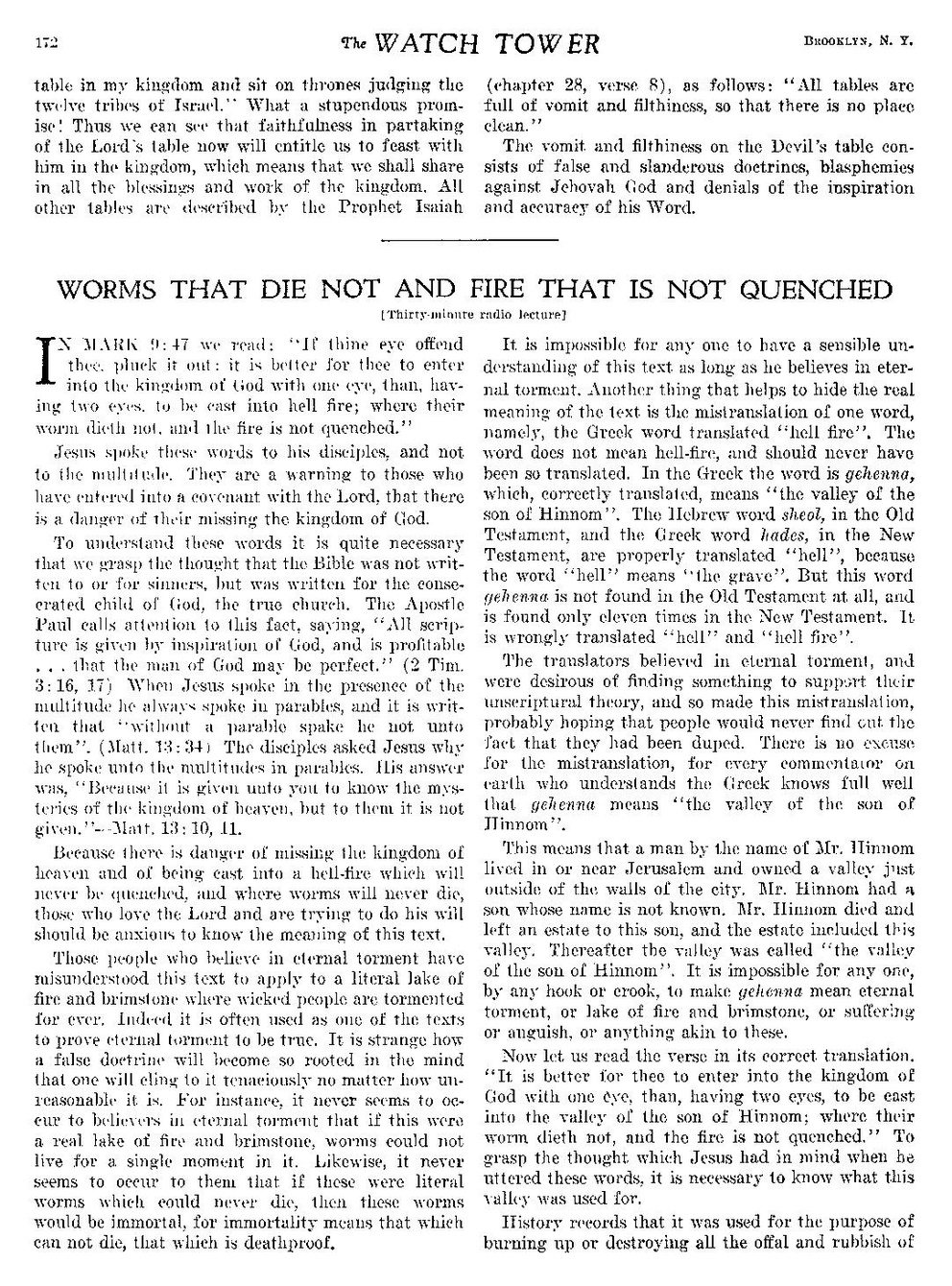table in my kingdom and sit on thrones judging the twelve tribes of Israel." What a stupendous promise. Thus we can see that faithfulness in partaking of the Lord's table now will entitle us to feast with him in the kingdom, which means that we shall share in all the blessings and work of the kingdom. All other tables are described by the Prophet Isaiah
(chapter 28, verse 8), as follows: "All tables are full of vomit and filthiness, so that there is no place clean" The vomit and filthiness on the Devil's table consists of false and slanderous doctrines, blasphemies against Jehovah God and denials of the inspiration and accuracy of his Word.
In Mark 9:47 we read: "If thine eye offend thee pluck it out: it is better for thee to enter into the kingdom of God with one eye, than, having two eyes, to be east into hell fire; where their worm dieth not, and the fire is not quenched." Jesus spoke these words to his disciples, and not to the multitude. They are a warning to those who have entered into a covenant with the Lord, that there is a danger of their missing the kingdom of God. To understand these words it is quite necessary that we grasp the thought that the Bible was not written to or for sinners, but was written for the consecrated child of God, the true church. The Apostle Paul calls attention to this fact, saying, "All scripture is given by inspiration of God, and is profitable...that the man of God may be perfect." (2 Tim. 3:16,17) When Jesus spoke in the presence of multitude he always spoke in parables, and it is written that "without a parable spake he not unto them". (Matt. 13:34) The disciples asked Jesus why he spoke unto the multitudes in parables. His answer was. "Because it is given unto you to know the mysteries of the kingdom of heaven, but to them it is not given." - Matt. 13:10,11. Because there is danger of missing the kingdom of heaven and of being east into a hell-fire which will never be quenched, and were worms will never die, those who love the Lord and are trying to do his will should be anxious to know the meaning of this text. Those people who believe in eternal torment have misunderstood this text to apply to a literal lake of fire and brimstone where wicked people are tormented for ever. Indeed it is often used as one of the texts to prove eternal torment to be true. It is strange how a false doctrine will become so rooted in the mind that one will cling to it tenaciously no matter how unreasonable it is. For instance, it never seems to occur to believers in eternal torment that if this were a real lake of fire and brimstone, worms could not live for a single moment in it. Likewise, it never seems to occur to them that if there were literal worms which could never die, then these worms would be immortal, for immortality means that which can not die, that which is deathproof.
It is impossible for any one to have a sensible understanding of this text as long as he believes in eternal torment. Another thing that helps to hide the real meaning of the text is the mistranslation of one word, namely, the Greek word translated "hell fire". The word does not mean hell-fire, and should never have been so translated. In the Greek the word is gehenna, which, correctly translated, means "the valley of the son of Hinnom". The Hebrew word sheol, in the Old Testament, and the Greek word hades, in the New Testament, are properly translated "hell", because the word "hell" means "the grave". But this word gehenna is not found in the Old Testament at all, and is found only eleven times in the New Testament. It is wrongly translated "hell" and "hell fire". The translators believed in eternal torment, and were desirous of finding something to support their unscriptural theory, and so made this mistranslation, probably hoping that people would never find cut the fact that they had been duped. There is no excuse for the mistranslation, for every commentator on earth who understands the Greek knows full well that gehenna means "the valley of the son of Einnom". This means that a man by the name of Mr. Hinnom lived in or near Jerusalem and owned a valley just outside of the walls of the city. Mr. Hinnom had a son whose name is not known. Mr. Hinnom died and left an estate to this son, and the estate included this valley. Thereafter the valley was called "the valley of the son of Hinnom". It is impossible for any one, by any hook or crook, to make gehenna mean eternal torment, or lake of fire and brimstone, or suffering or anguish, or anything akin to these. Now let us read the verse in its correct translation. "It is better for thee to enter into the kingdom of God with one eye, than, having two eyes, to be cast into the valley of the son of Hinnom; where their worm dieth not, and the fire is not quenched." To grasp the thought which Jesus had in mind when he uttered these words, it is necessary to know what this valley was used for. History records that it was used for the purpose of burning up or destroying all the offal and rubbish of
